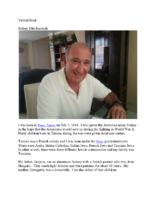Search the Special Collections and Archives Portal
Search Results

Transcript of interview with Rabbi Malcolm Cohen by Barbara Tabach, December 16, 2015
Date
Archival Collection
Description
In this interview, Rabbi Malcolm Cohen speaks about observed differences between British and American Jewish communities as well as new Temple Sinai initiatives to build community and engage younger congregants. Rabbi Cohen and his wife have two children, Elijah and Rachel.
Rabbi Malcolm Cohen was born on October 7, 1973 in London, England. He describes having the typical Reform Jewish upbringing of a second generation Londoner. His mother worked as an office assistant, and his father ran a bookshop and also prepared youth for their bar and bat mitzvahs. It was his father?s dedication to Jewish education and service that greatly influenced his career path. After earning a degree in psychology from Southampton University, Rabbi Cohen went on to get a professional qualification in youth and community work. He subsequently became the British Reform movement?s first outreach officer, leading the efforts to engage 20- and 30-year-olds to Judaism. At his wife, Sarah?s, encouragement, Rabbi Cohen enrolled in Leo Baeck College to become a rabbi. Upon finishing his studies in 2006, he got a job at West London Synagogue, a large Reform congregation, where he worked with a team of rabbis. In 2009, Rabbi Cohen took the position as Temple Sinai?s rabbi, where he has served ever since. In this interview, he speaks about observed differences between British and American Jewish communities as well as new Temple Sinai initiatives to build community and engage younger congregants. Rabbi Cohen and his wife have two children, Elijah and Rachel.
Text
Arthur Marshall oral history interview
Identifier
Abstract
Oral history interview with Arthur Marshall conducted by Barbara Tabach on April 18, 2018 for the Southern Nevada Jewish Heritage Project. In this interview, Marshall discusses his early life in Ohio and moving to Las Vegas, Nevada in 1959. He talks about his Jewish heritage, the growth of the Jewish community in Las Vegas, and his role as a Jewish leader. Lastly, Marshall remembers the formation of the apparel store Marshall Rousseau, and working with local banks.
Archival Collection
Jay Poster oral history interview
Identifier
Abstract
Oral history interview with Jay Poster conducted by Barbara Tabach on August 26, 2016 for the Southern Nevada Jewish Heritage Project. Poster describes his growth through his career in funeral services and his respect for the Jewish traditions of burial and grieving. He also talks about his participation in the ShabbaTones Band at Congregation Ner Tamid, and Desert Winds, a community based performance organization.
Archival Collection
Fran Fine oral history interview
Identifier
Abstract
Oral history interview with Fran Fine conducted by Barbara Tabach on March 04, 2015 for the Southern Nevada Jewish Heritage Project. Fine talks about her career as an attorney and family court judge. She also discusses her activity in Las Vegas, Nevada’s Jewish education, women's philanthropy and the Las Vegas Jewish Federation.
Archival Collection

Transcript of interview with Yvonne and Joni Fried by Barbara Tabach, February 17, 2016
Date
Archival Collection
Description
Yvonne Fried, M.D., and Joan “Joni” Fried are the daughters of Milton and Esther Fried, the founders of Freed’s Bakery—the standard to which all other Las Vegas bakeries are held. When the Fried family moved to Las Vegas in 1955, Joni was born here, the fifth child, of the entrepreneurial Milton, a musician by night, and his industrious wife Esther, who guided the family business. As Esther’s 2006 obituary reads: in 1959 the couple opened “a snack bar, selling donuts and Danish, at the Panorama Market on West Charleston, while Milt played in the show band at the Sahara Hotel in the evenings.” For Yvonne and Joni, this made for a rather busy and interesting household to grow up in. Their Jewish upbringing was at Temple Beth Sholom. Photo above honors the multi-generations of the Freed’s Bakery tradition: (L-R) Joni Fried, Anthony & Sarah Fusco (Joni’s daughter) Max Jacobson Fried (Yvonne’s son) holding his son Lucas, and (far right) is his wife Emilia.
Text
Phyllis Friedman oral history interview
Identifier
Abstract
Oral history interview with Phyllis Friedman conducted by Barbara Tabach on March 02, 2015 for the Southern Nevada Jewish Heritage Project. In this interview Friedman talks about first coming to Las Vegas, Nevada to work for the Jewish Federation of Las Vegas (now Jewish Nevada). Then she discusses what made the Anti-Defamation League's (ADL) work unique and about ADL’s programming fighting cyberbullying. The interview finishes with her talking about work in addressing and combatting anti-Semitism and listing other influential Jewish organizations working in Las Vegas.
Archival Collection

Transcript of interview with Wilma and Burt Bass by Barbara Tabach, February 9 , 2015
Date
Archival Collection
Description
In 1939, Wilma (Frank) Bass was born in New York City, where she began her involvement in theater at the age of ten. Almost twenty years later, she met Burt Bass (1932- ) when both worked for a photography studio, one of Burt first post-high school jobs. Burt opened his first professional photography studio in 1962, shortly after he married Wilma in 1960. The couple soon had two daughters – Jill and Wendy – and moved to Las Vegas in 1974. Burt initially worked for his brother-in-law Ed Frank's check cashing businesses and later opened his own photography business, Burton Studio. He later added services such as fingerprinting, background checks, and photographs for identification cards. Wilma worked as a jewelry salesperson, first at the Gold Factory then at Nieman Marcus. Socially, she was very involved with Temple Beth Sholom’s Sisterhood, using her theater talents to write, direct and produce various shows for the Sisterhood, ORT as well as B’nai B’rith Youth Organization. In this interview, Burt discusses his photography business, the migration of its storefront around town, and his colorful landlords, including individuals like Moe Dalitz and Art Marshall. Wilma talks about her sales career in the local jewelry industry, and more extensively, she shares memories of her involvement in the Jewish community with theater productions. Much of the discussion revolved around related news articles and personal photos from their relationships and activities within the Jewish community. The couple also shares stories of friendships with local entertainers, including Jerry Lewis and Neil Sedaka.
Text

Biographical essay by Sidney Barouch, 2014
Date
Archival Collection
Description
Sidney Barouch describes his experience during World War II living in Tunis, Tunisia, which was a French colony. Barouch discusses the facets of the war front in northern Africa, and the experiences of his family as Jews and business owners.
Text

Transcript of interview with Hershel Brooks by Barbara Tabach, December 8, 2016
Date
Archival Collection
Description
Hershel Brooks was born December 3, 1930 in Brooklyn, New York. He was raised in an orthodox Jewish household, along with his four siblings, and attended Jewish community schools before pursuing his rabbinical studies. He studied at TelsheYeshiva in Cleveland, Torah Vodaath in New York, and Jewish Theological Seminary in New York. Before assuming his first rabbinical position, Brooks married his wife, Alma, and graduated with his BA from the University of Miami. He was first hired by a conservative congregation in Miami, and subsequently led congregations in Savannah, Georgia, Greensboro, North Carolina and Philadelphia, Pennsylvania. Eventually, he joined a temple in Anaheim, California, where he served for twenty years. In 1996, Brooks retired to Las Vegas. He was soon asked to lead services at Temple Bet Knesset Bamidbar [BKB] twice a month as its rabbi. He still is active at BKB, though he retired in 2011. In this interview, Brooks reflects on his family background and the path that lead to his becoming a rabbi in the Conservative Jewish Movement. He talks about his career, including his involvement with BKB as well as other Jewish community service, including facilitating adult bar mitzvah classes and serving on the local Rabbinical court of Judaism, known as Bet Din.
Text

Transcript of interview with Gary Sternberg by Barbara Tabach, February - April, 2015
Date
Archival Collection
Description
In this oral history, Gary explains how the family came to live in the United States?Cleveland and Los Angeles. In 1957, he married Noreen and they eventually came to live in Las Vegas where Gary worked for Sears selling washing machines, had a repair business and an importing business with Noreen. Gary was an entrepreneurial soul and inventive much like his father. He owns three patents.
On August 25, 1931, Augusta and Herman Sternberg welcomed their second child, Gerd (aka Gary), into the world of Cuxhaven, Germany. Augusta was a devout Christian of Polish ancestry who had fled Russian persecution. Herman was a German-born Jew salesman and inventor. The couple fell in love and had two children, Gary and Ruth who was a year and half older. By 1938, German politics were targeting Jews and Herman was ripped away from his Christian wife and children and sent to a concentration camp. Fate and friendship rescued Herman with the option to go to China. And so begins the history of the Sternberg family and how they all would eventually live together during World War II in the confines of a Jewish ghetto in Hongkew, China from May 1939 to July 1948. Gary had an extraordinary career as a dealer. He was not the stereotypical young dealer-to-be: he was in his 40s when he signed up for the Michael Gaughn Dealing School in the mid-1970s. Gary?s charming wit and ease of making friends soon gained him a position at El Cortez and then Caesars Palace. It was the same personality that would sustain his stellar thirty-one year career at Caesars. He was employed there from April 1974 until his retirement May 8, 2005. Though Jewish tradition would identify Gary as Christian, he self-identified as Jewish, officially converted and has been an active member of the Jewish community. Among his anecdotes-and he has many-is one about securing a $30,000 donation from Frank Sinatra and Jilly Rizzo for Congregation Ner Tamid.
Text
